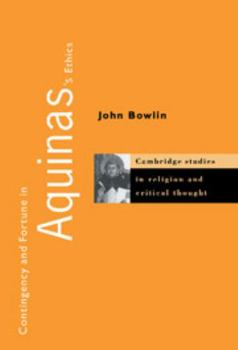Contingency and Fortune in Aquinas's Ethics
Select Format
Select Condition 
Book Overview
Bowlin argues that the strength of Aquinas' moral theology is his assumption about our common lot: the good we desire is difficult to know and to will, particularly because of contingencies of various kinds--within ourselves, in the ends and objects we pursue, and in the circumstances of choice. Since contingencies are fortune's effects, Aquinas insists that fortune makes good choice difficult. Bowlin explores Aquinas' treatment of virtue, agency,...
Format:Hardcover
Language:English
ISBN:0521620198
ISBN13:9780521620192
Release Date:June 1999
Publisher:Cambridge University Press
Length:250 Pages
Weight:1.00 lbs.
Dimensions:0.7" x 6.0" x 9.1"
Customer Reviews
0 rating





